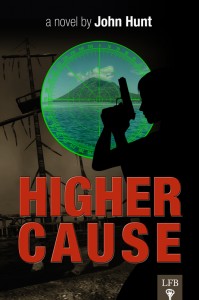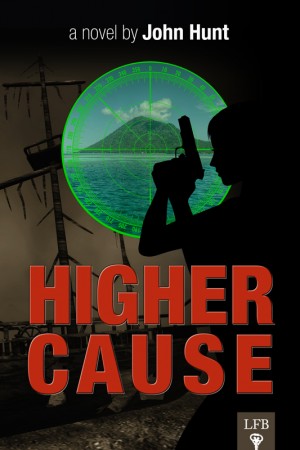

With an official release date of October 30, 2012, just in time for Halloween, author Tarrin Lupo presents us with a new sort of vampire tale that is certain to make any libertarian’s skin crawl. While not intended to be a traditional horror novel, One Nation Under Blood is nonetheless a frightening tale of what can happen when government regulation and patriotism go too far.
In Lupo’s dystopian novel, it is discovered that blood transfusions can offer more than the gift of life to a needy recipient. Performed correctly, they serve as a fountain of youth, transferring rejuvenating properties from the blood of a child into the veins of an adult. Older generations are thrilled at the chance to become healed of their ailments and erase years from their appearance, leading to a huge demand for young blood that creates an unparalleled shift in the balance of wealth from the old to the young.
When blood transfusions become a target for politicians eager to profit from the new technology, the demand overwhelms the willing donor population and a new source of young blood must be found. By the power of legislation and with the help of a successful propaganda campaign, orphans and the children of immigrants are soon forced into concentration camps where they are made to give up their blood as a patriotic service to their country.
By telling the story through the eyes of those being taken advantage of, the author allows us to put ourselves in the place of those who face similar discrimination today. Although the novel is fiction, readers will find many similarities between the story world and our own. Perhaps the scariest notion is that we can easily imagine our society being swayed into nearly identical unspeakable actions under the pretense of protecting the children.
[continue reading…]
Help Promote Prometheus Unbound by Sharing this Post

This review is part of a series covering each installment of the serialized novel Higher Cause, written by John Hunt and published by Laissez Faire Books. To catch up, start with the announcement, the book’s link-rich table of contents, and the first review.

There are a lot of plot lines this week. Just about all the major players, in fact, make an appearance.
We visit the Marcos family, where things in Mexico have nearly reached a climax point, and so has the family dynamic.
Elisa, still arousing my suspicions, briefs Petur and paints a picture of dark clouds on the horizon.
Onbacher makes some headway, perhaps, in his search for the Bounty.
The council of oligarchs comes on stage for a short while.
Finally, we see where Jeff Baddori has ended up. There is the potential problem of logic in this part, because it raises some questions that will need some plausible answers. For now, though, it certainly intensifies things.
The three chapters this week bring us perspectives from all the important storylines. Each either establishes something important or moves the plot forward. Most leave the story dangling tantalizingly in the air, waiting for another chapter so we can see what comes next. It is this aspect of the book, the chapter endings, that stand out most. It is what the author has developed the most in his writing technique.
[continue reading…]
Help Promote Prometheus Unbound by Sharing this Post

This review is part of a series covering each installment of the serialized novel Higher Cause, written by John Hunt and published by Laissez Faire Books. To catch up, start with the announcement, the book’s link-rich table of contents, and the first review.

This week is more about setting things up than reaping payoffs. Onbacher proceeds with his plan to find the Bounty, but that is the only significant plot point in the three chapters. This is not to say that the chapters are skippable, because we catch glimpses of plots and machinations whose culminations will no doubt explode in future chapters, but we do get a little time to catch our breath. There have been some rather kinetic chapters of late, so like a symphony whose music is a contrast of louds and softs, and fasts and slows, and sharps and smooths, we catch our breath and proceed pianissimo, with perhaps one sequence as exception.
There are dark characters lurking on The Island. Hunt once again introduces things slowly, like a tease, as he should. The possibilities are numerous but over the course of the next few chapters we will no doubt start to narrow them down until we find out just what these people are up to.
It bears noting that there has been a lot of reliance on chance partial sightings, conversations improbably overheard, and the like. This technique can quicken the pulse and is often used to get a plot started, or to introduce a twist, but overuse wears out anything. I would hope not to see it used too much more.
We also revisit the Marcos family for another interaction between father and son, one that leaves us more engrossed than it found us. I will say that the removal of one character from the family scenario was a lost opportunity, but there is a hint that she may return. I really want to see more from them.
[continue reading…]
Help Promote Prometheus Unbound by Sharing this Post

This review is part of a series covering each installment of the serialized novel Higher Cause, written by John Hunt and published by Laissez Faire Books. To catch up, start with the announcement, the book’s link-rich table of contents, and the first review.

We cruise into chapters 30 and 31 with the most recent offering from Higher Cause. Both chapters take place on The Island. They deal with a couple of different strands of plot. A growing suspicion comes closer to being confirmed.
Enough time has passed to allow Petur and Jeff to fully recuperate from their injuries during the attack on the OTEC. Jeff makes a brief appearance before leaving for other areas of the globe as part of his investigations. Elisa, meanwhile, returns to The Island and Petur grows more and more smitten with her.
Elisa continues to dress as unattractively as she can manage, though Petur can see through it and is pretty sure she could be a knockout if she tried. On a couple of different occasions she is caught by surprise by Petur and quickly adjusts her appearance to minimize her appeal. The reasons for this are still unclear, but Petur has begun to wonder about it. This, coupled with another occurrence, makes me suspicious about her motives, although she has been nothing but helpful to Petur and The Island to date.
The alluring brunette whose pheromones have sunk hooks into Petur is seen again, and by now the faithful reader will probably have a good idea as to who she is. If my hypothesis is right, it only heightens my suspicions. It is a plot thread with a lot of promise.
All in all, another successful bit of work. There is, however, one thing that I have been waiting for and have seen little of so far. The Island seems to be functioning smoothly, with a freed economy that is beginning to heat up. However, there is little mention of how they handle the services that government keeps for itself. How are disputes resolved? How is punishment meted out? How are claims adjudicated? The question of security is not so pressing, because the world already has more private security than government cops, but the question of arbitration and enforcement is altogether different.
[continue reading…]
Help Promote Prometheus Unbound by Sharing this Post

Get it for free in epub and mobi formats!

“What ifs” are the bread and butter of science fiction. What if organized crime overthrew the United States government and took over? What would life be like under the mafia? Would the people of North America be better off? These are the questions C.M. Kornbluth sought to answer in his science-fiction novel The Syndic (1953).
The Syndic is of interest to libertarians, not least because it was honored with the Prometheus Hall of Fame Award in 1986 by the Libertarian Futurist Society. This edition of the novel includes a forward and an afterward by Jeff Riggenbach that set the historical context for Kornbluth’s work and life and their relevance to libertarians. The Syndic is a fast-paced, entertaining tale replete with insights into the nature of the state and of war. Indeed, it could arguably be deemed an antiwar novel; but the insights do not end there.
As The Syndic opens, the continent of North America has long been divvied up between the Syndic and the Mob. The former United States government continues to exist in exile in Iceland and Ireland as the North American Government (NAG; an apt acronym). After an odd prologue composed of historical documents that set the stage for us, we’re introduced to our main viewpoint character, Charles Orsino, a low-ranking young bagman for the Syndic, who spends his days politely shaking down small businesses in the 101st New York Police Precinct for protection money and playing a brutal version of polo with jeeps and firearms instead of horses and mallets.
[continue reading…]
Help Promote Prometheus Unbound by Sharing this Post

This review is part of a series covering each installment of the serialized novel Higher Cause, written by John Hunt and published by Laissez Faire Books. To catch up, start with the announcement, the book’s link-rich table of contents, and the first review.

We start out the second half of the book with two more chapters. Hunt is starting to benefit from the seeds planted in earlier chapters. There is a lot going on, a lot of side plots and characters to worry about, and as each advances, they give us that mild euphoria that comes from a new development or a new clue revealed. With so much to work with, these developments and clues come tumbling out of the prose at us.
The first chapter begins with some medical care for Jeff Baddori. It catches us up to date with Dr. Thomas Standall, whom we met earlier. The research done into the wounds that Jeff and Petur received adds a lot to the narrative. It also allows for some pro-market explanations. I would have omitted the first three paragraphs and had the information therein come out as dialogue though.
The second part of the first chapter is a bracing search for the bad guys. This time, something is found. It’s a stimulating little stretch of prose and leaves us with the certainty of trouble ahead.
The second chapter deals with Onbacher’s theories about the Bounty. He has made some progress in his own search, which he confesses was, initially, his principle interest in The Island. The novel has a lot of appealing aspects, and this is one of the main ones. It takes a historical fact, fills in a lot of gaps with some real imagination and then connects it all to the present narrative, which does not have to have anything to do with it. It could survive quite well on its own, but the addition of the historical fiction enriches the tale.
[continue reading…]
Help Promote Prometheus Unbound by Sharing this Post


Logic is never kind to a story about time travel. It seems that no matter what idea or aspect of so-called fourth dimensional travel a storyteller wishes to pursue, something does not work right — contradictions abound. The biggest plot holes in the history of fiction are to be found therein. For my money, this is the first and best reason to suppose that time travel is not possible. Reality is nothing if not possible and plausible — at least from the perspective of one in possession of the relevant facts — and if a story cannot be made to work right when time travel is involved, reality probably cannot either.
There is, however, a lot of potential in such tales. If a viewer will but suspend his disbelief and allow an author or filmmaker to explore one possibility while forgetting its necessary and contradictory corollaries, then some interesting possibilities may be realized. Rian Johnson has done a first-rate job of spinning a time-traveling yarn with the new movie Looper, if the audience will afford it such consideration.
The year is 2044, and time travel, as we are told by the narrator and protagonist (played by Joseph Gordon-Levitt), is not yet invented. Thirty years in the future, it is/will be (it occurs to me that we need another tense or two in the English language when we discuss these things). It is illegal, though, and only mobsters make use of it, to send back their targets to be eliminated and their bodies disposed of. The men who do the eliminating and disposing are called loopers, and they earn that appellation when they close their own loop by, at the end of their contract, killing their 30-years-older selves.
Our protagonist, called simply Joe, is a drug abusing, well-dressed looper with a manner perhaps a bit too refined, and a face perhaps too smooth and handsome, for someone in his station. Leonardo DiCaprio, in The Departed, managed to overcome his golden beauty and give a convincing portrayal of a hoodlum. I would have preferred something rougher like that in Looper. Gordon-Levitt has all the makings of a leading man, but I thought the role he portrayed in this film was not quite the right one.
[continue reading…]
Help Promote Prometheus Unbound by Sharing this Post
















